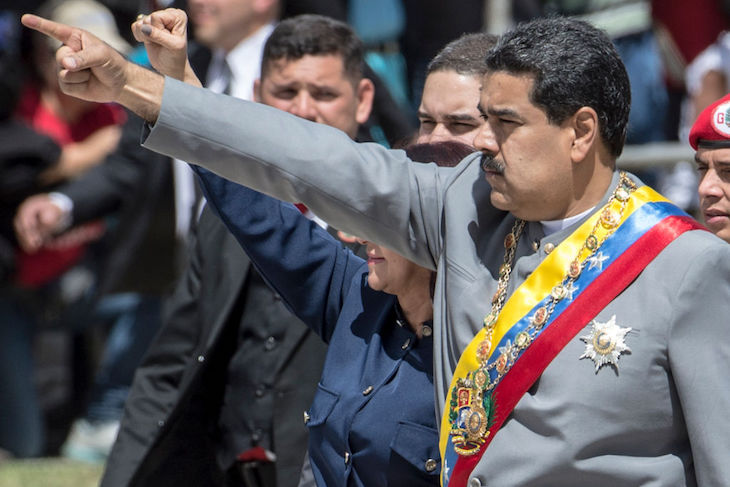Jeremy Corbyn finally broke his silence on Venezuela this week, but in the manner of a man who has his head buried in a very large bucket of sand. He condemned violence ‘on both sides’, painting the country’s problems as a battle between factions rather than a case of a repressive government snuffing out popular protests. No one would know from the Labour leader’s words that President Maduro’s regime is engaged in what the UN Human Rights Office described this week as a ‘widespread and systematic use of excessive force’.
More revealing still was Corbyn’s reply when prodded on the economic and social conditions which led to the protests. The economy needed to diversify away from oil, he suggested, adding: ‘but we also have to recognise that there have been effective and serious attempts at reducing poverty, improving literacy and improving the lives of the poorest people’. It is hard to believe that he was speaking about a country where, according to the IMF, the economy shrank last year by 8 per cent, inflation hit 481 per cent, unemployment was 17 per cent, and where malnutrition is now widespread. Jeremy Corbyn has become a latter-day Walter Duranty, the New York Times reporter who in 1932 won the Pulitzer Prize for a series of glowing reports from Stalin’s Soviet Union which turned a blind eye to its manufactured famine.
It is impossible to embark on a fair discussion about Venezuela’s problems without acknowledging the disastrous economic experiment to which the country has been subjected under the leadership of the late Hugo Chavez and his successor Nicolas Maduro. The economic problems did not begin when Chavez was elected president in 1999; the country had already declined since 1970, when it had a higher income per capita than Spain and was among the world’s ten richest countries. But Chavez put it on a highly destructive course. He used its vast oil wealth to subsidise food and other handouts to the poor, undermining native agriculture and other industries. Price controls destroyed markets, removing incentives to do business. Venezuela’s economy was not destroyed by a low oil price — the national oil company had already been run into the ground thanks to Chavez handing it over to be run by his cronies. Following Chavez’s death in 2013, Maduro compounded the error by trying to print his way out of economic crisis, fuelling the hyperinflation which has now caused such misery.
The demand that Corbyn condemn Maduro, and the legacy of Chavez, has been ridiculed by some on the left. Why should he speak out about a little local difficulty in Venezuela, they assert, when Theresa May hasn’t bothered herself to attack Saudi Arabia’s human rights record? But that is to confuse the sometimes ugly demands of realpolitik — where prime ministers have to build relations with countries which don’t live up to western standards of democracy — with the fawning tributes which Corbyn has repeatedly paid to Chavez and his successor.
It wasn’t the interests of the nation which drove Corbyn to attend a vigil for Hugo Chavez in 2013 and praise him for providing ‘inspiration to all of us fighting back against neoliberalism and austerity in Europe and showing us there is a better way of doing things. It’s called socialism, it’s called social justice and it’s something that Venezuela has made a big step towards.’ Corbyn was swept along by Chavez and Maduro out of naive ideology. He has never outgrown student politics, with its need for heroes and pin-up revolutionaries.
When a British political leader has bestowed such warm words on an overseas regime which is rotten to the core, there is an imperative to recant when the truth finally dawns. That Corbyn cannot bring himself to do so indicates what kind of politician he is: one who is all but devoid of pragmatism. Of course, there have been Labour figures in the past who came in from the far left to become moderate politicians. Alistair Darling, once described by Neil Kinnock as a ‘bearded Trot’ whom he never wanted to see become an MP, is remembered now as the rather dull but generally sensible chancellor of the exchequer who managed the economy through the banking collapse. But there is little sign that Jeremy Corbyn could ever make such a transition to the mainstream. His instinct is always to cling to socialism, whatever the evidence of its failures.
It takes some imagination to see Britain collapsing like Venezuela. Our parliamentary system, our tradition of free and open debate, would surely be strong enough to provide ample opposition if a British Chavez tried to take the country on a ruinous path. Yet Corbyn’s refusal to denounce Maduro even now, when left-wing leaders around the world have done so, does not inspire confidence that a government led by him would be a benign experience. If his policies did start to shrink the economy, what would it take for him to appreciate what he was doing?
The prospect of a Corbyn government has receded a little since the immediate aftermath of the general election, yet it remains a genuine possibility. His continued efforts to lionise Venezuelan socialism should not be forgotten.






Comments